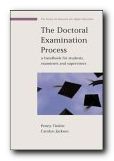This is an ambitious book with three separate audiences. It’s main strength is that it is based on research at twenty British universities – eleven ‘old’ and nine ‘new’. Tinkler and Jackson’s approach assumes that the research has been done and the work has been submitted. So it begins withe the Viva – which the Burnham committee described as ‘one of the best kept secrets in British higher education’. They seek to de-mystify the process by looking at what the viva is for, what the expectations of students and examiners are, and what rules (if any) surround the process.
 These are more varied (or non-existent) than you might imagine. It turns out rather surprisingly that at the University of Glamorgan for instance, you can pass the viva even if you are dead. Next comes what examiners might be looking for in the thesis which will be discussed during the viva – followed by advice on how to prepare for the experience, short and long term.
These are more varied (or non-existent) than you might imagine. It turns out rather surprisingly that at the University of Glamorgan for instance, you can pass the viva even if you are dead. Next comes what examiners might be looking for in the thesis which will be discussed during the viva – followed by advice on how to prepare for the experience, short and long term.
Their suggestions are that you should be presenting papers in the department or conferences, attending training courses, and even publishing your own work.
Next come observations on the selection of examiners. Who chooses them? What are their qualifications? And should your supervisor attend the viva as well?
Despite the mystique which still surrounds this part of PhD examination, there are a lot more open regulations these days. Both students and newly appointed supervisors and examiners would do well to read these chapters.
There are also some fascinating case studies illustrating practices in foreign universities, as well as some cautionary tales from the UK where the ‘flexibility’ in the system sometimes means things go wrong.
They then offer something I have never come across before – guidance to examiners on how to assess a doctoral thesis. They even cover a number of different disciplines in doing so. Then it’s a return to support and preparation for the student – using mock vivas and last minute revision.
Finally, they deal with what happens behind the closed doors of the viva itself. (More case studies of horror stories and triumphs.) How to deal with the questions; how to create a confident impression; how to overcome nervousness.
They are right to stress the range of possible outcomes for which candidates should be prepared. If the result is not what you had hoped for, they even cover the appeals process – as well as how to celebrate afterwards if it’s a success.
I think students will find the quotations and real life case studies really interesting. New supervisors and examiners will get an informative overview with some useful comparative studies from a variety of institutions.
© Roy Johnson 2005
Penny Tinkler and Carolyn Jackson, The Doctoral Examination Process, Maidenhead: Open University Press, 2004, pp.228, ISBN: 0335213057
More on study skills
More on writing skills
More on online learning